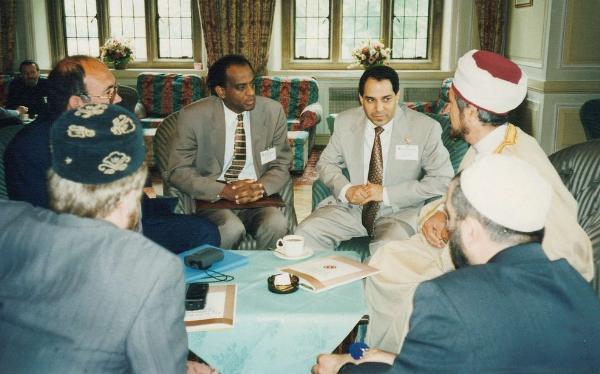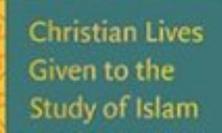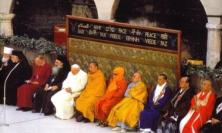In a new document, the Catholic bishops of England and Wales explore the practice of and call to interreligious dialogue. Michael Barnes SJ examines the themes in Meeting God in Friend and Stranger, which reminds us that whenever we embrace the ‘atmosphere of curiosity’ that stimulates interreligious exchanges, we are participating in the very dialogue that God initiated with humankind.
Not that many years ago inter-faith meetings of any kind were a novelty. Now they are routine. One I went to last week was fairly typical. Held at the London Central Mosque, it was efficiently organised, relaxed and enjoyable. Friendly exchanges were made over a delicious meal, brief and insightful accounts were given of current and future projects, new contacts were made and old ones revived. Jews, Muslims and Christians relaxed in each other’s company and came away consoled and energised by what they had shared.
To speak of such gatherings as routine is not to underestimate their importance, nor to ignore the amount of work which goes into their preparation. That people from different faiths and cultural backgrounds should be able to meet and talk fruitfully is testament to the practical wisdom which has grown over the last couple of decades, most of it coming from within the major religions but some focussed on independent agencies and voluntary organisations committed to forging links between people of faith. Amazingly in our fraught and volatile multicultural society, where fragmented and deeply divided communities often view each other with suspicion and fear, bridges have been built and networks of co-operation established. There is now a considerable wealth of experience which witnesses to what is possible when, as the youngest speaker at the meeting neatly put it, people have managed to foster ‘an atmosphere of curiosity’.
Living in positive relationship
I thought about that phrase when, a couple of days later, I was present at the launch of a teaching document recently released by the Catholic Bishops’ Conference of England and Wales. Meeting God in Friend and Stranger is based on generous Catholic virtues of hospitality and concern for the common good.[1] In a lucidly presented text, which brings together conciliar and papal teaching, the ‘facts and figures’ of religious living in the UK, examples of good practice in interreligious dialogue, the bishops remind Catholics that the Church is charged with continuing the dialogue that God has begun with the whole of humankind. There are, of course, many forms of dialogue, from working together as good neighbours to experiencing something of each others’ faith and culture and engaging in conversation about important themes and ideas. Primarily, however, as John Paul II put it in a telling phrase, ‘dialogue is not so much an idea to be studied as a way of living in positive relationship with others’.[2]
The document is not a theological treatise and does not set out to solve all the tricky issues which confront the Church in a pluralist world. The questions are there, of course, most obviously about the relationship between dialogue and more traditional forms of mission such as proclamation. Several times versions of that tension are noted, especially the claims of love and respect, on the one hand, and the need to keep a ‘firm grasp’ on Christian faith, on the other. Any resolution, however, is not to be achieved by some theoretical balancing act. Dialogue of the interreligious kind is not about getting the final communiqué right; it is about living out a principled practice which recognises that, to use the language of the document’s title, strangers can become friends. Religions always look rather different when they are refracted through the face of fellow human beings. The challenge is to let such faces get close enough so that the differences - and the similarities - can be observed and valued for what they truly are. The document is, therefore, intended as a resource for the life and mission of the Church, and specifically for the Catholic people of the UK who in parishes, chaplaincies and schools everywhere find themselves increasingly playing a mediating role at the tricky interface between communities of faith.
‘Acknowledge, preserve and encourage’
There’s an extraordinary richness in what has been gathered together in the document’s ninety odd pages. When Nostra Aetate, Vatican II’s declaration on the relationship of the Church to non-Christian religions, exploded on to the interreligious scene in 1965, a Catholic theology of religions did not exist. If non-Christians figured at all it was under the general theme of soteriology; how do ‘they’ fit into ‘our’ theological view of things? Now, thanks in no small measure to the efforts of theologians like Karl Rahner, Jacques Dupuis and Raimon Panikkar, the question is about how with integrity Christians can enter into positive and mutually beneficial relations with people from other religious cultures and traditions.
Nostra Aetate does not say how this is to be done. Rather, if Christians are to be effective witnesses to the truth of the Gospel in a pluralist world, we are called not just to speak but to listen and learn ‘through conversation and collaboration’.[3] The Church rejects nothing that is ‘true and holy’ in other religions. We are, of course, duty bound to proclaim Christ who is ‘the way, the truth and the life’, but we also hold in high regard whatever in those traditions reflects a ‘ray of that truth’ which is Christ. Nostra Aetate thus makes an extraordinary demand, that we ‘acknowledge, preserve and encourage the spiritual and moral truths’ to be found in other religions.[4]
These are strong words, and quite uncompromising. Every time I read them they make me pause – for the implication is that interreligious dialogue is not an option for a few liberally minded groupies. Pluralism, in the sense of plurality, the co-existence in one society of many religions and world-views, is not just to be accepted as a fact of life. It challenges all forms of parochialism and defensiveness. ‘To resent diversity in principle’, say the bishops, ‘is to exclude ourselves from the possibility of being enriched by what others might have to offer. This does not correspond to a Christian, and especially a Catholic, vision’.[5]
Dialogue in practice
So much changes when the ‘atmosphere of curiosity’ – a God-given sensitivity to what the early Fathers of the Church called ‘seeds of the Word’ – takes over from attitudes of suspicion and fear which refuse to see the friend in the stranger. As well as explaining how good Catholic interreligious practice has emerged from Vatican II and subsequent theological reflection, the bishops touch specifically on prayer and worship, interreligious marriage and life ‘at the local level’. There is much practical advice about how people of faith can take part in now familiar activities like peace pilgrimages and simple symbolic acts like lighting lamps and listening to each other respectfully in silence. To invoke the distinction made famous by John Paul II’s celebrated meeting with other faith leaders at Assisi, we may not ‘pray together’ but we may ‘come together to pray’.
For the ever-increasing numbers of couples in interreligious marriages and partnerships the document is an invaluable resource, clearly setting out Catholic teaching yet acknowledging the traditional religious and moral values enshrined in the teachings of other religions with regard to marriage and the family. Such relationships can, of course, be problematic, if only because differences of faith and culture can create real barriers to marital intimacy. Nevertheless, where interreligious couples decide to marry, they are always entitled to the support of the Church. Interreligious marriage can lead to the most profoundly enriching examples of the ‘dialogue of life’. Accordingly we ‘should collaborate with these religions, as much as in conscience we are able, in witnessing to the dignity and crucial importance of marriage in contemporary British society’.[6]
It is this common witness, expressing a sort of solidarity in faith in the midst of a secular and at times areligious society, which is stressed when the bishops come to the responsibility which Catholics share with other Christians and people of faith for the common good of society. The now familiar term ‘social capital’ describes the value which religious structures and institutions, from church buildings to the social enterprises which faith empowers, add to human relationships. Traditionally in the UK, the major responsibility for maintaining the ‘social glue’ has fallen on the Church of England. That responsibility is now more widely shared. ‘Because Christianity is the majority religion, it is Christian leaders in particular who have a crucial role as “bridge-builders”.’[7]
Theological value of dialogue
The document contains far more than basic principles and examples of good practice. If Nostra Aetate, andthe renewal of the Church’s intrinsic relationship to the living tradition of Judaism, is the origin of the revolution in the Catholic theology of religions, it has been consolidated in no small measure by the vision of Paul VI. His first encyclical, Ecclesiam Suam, is often referred to as the charter of dialogue. Much more is at stake here than a method of engagement with other faiths, a method supposedly appropriate to an age when traditional missionary proclamation has become difficult.
Hearing the Word, let alone speaking it in faith, has always been challenging. What has changed in recent decades is not the challenge which the Gospel makes to all people, Christians and others alike, to hear God’s Word in the world, but the fact that ‘non-Christians’ are Jews and Muslims, Hindus and Buddhists, people with their own voice and their own experience of that Word. Dialogue as a practice of faith or a form of mission has spiritual as well as social dimensions. But it also has a theological value in its own right. Thus Paul VI speaks about the ‘dialogue of salvation’ which, as the bishops put it, can be imagined as a ‘conversation initiated by the Father and conducted with human beings through Christ by the Holy Spirit active in the world.’[8]
Such a richly Trinitarian vision arises not from some grand design to totalise all forms of religious experience into a Christian scheme of things but, much more specifically, from ‘the story of God’s own involvement in our story, a God we confess to be Father, Son and Spirit’.[9] This is the story which gives substance and vitality to Christian faith and from which Christians draw inspiration to engage with others, to make strangers into friends. It is not that we live in the middle of the Paschal Mystery of the Death and Resurrection of Christ and then go out to engage in dialogue with others. More exactly we find ourselves caught up in the prior dialogue which God has already initiated by sending the Son and the Spirit into the world. When the Council speaks of the Church as ‘missionary of its very nature’[10], it is saying that each and every Christian participates through baptism in that mystery of divine dialogue which God opens up with humankind. This is the source of Christian motivation for interreligious encounter. ‘To turn away from even the attempt to dialogue is to despair of the power of God and of his risen Son to advance his own Kingdom of peace and love.’[11]
Curiosity and learning
In an appendix the document gives an impressive record of diocesan initiatives which have enhanced the local ‘atmosphere of curiosity’. From faith literacy programmes and exhibitions to study groups and councils of faith, the Catholic Church in the UK is making its own distinctive contribution to the common good. They are all bound up with the now familiar routine of interreligious dialogue – some well-established and confident, some small-scale and tentative – but, taken together, the work of people who are learners, people on a journey into God which is strictly endless. The Church today recognises that the Holy Spirit is at work, bringing to fruition what is true and holy in other religions. To accept that reality is not to collude in some empty relativism but, on the contrary, ‘to be faithful to the conviction that truth is one and universal, that there are glimpses of that one truth and supreme good in other religions, and that it is the one God who, in his loving Providence, is the Creator of those elements of truth and goodness’.[12]
Just occasionally, when the hard work of building good neighbourly relations has been done, when that elusive ‘atmosphere of curiosity’ has been fostered, one glimpses something more. That’s when a different and more absorbing form of interreligious dialogue can be said to begin, not with pragmatic considerations about social cohesion or pious aspirations for a global ethic, but with the recognition that something much more important, something which transcends personal or group interest, is at work. For so many people of faith, open and respectful exchanges which provoke the religious imagination and make human beings curious and ready to learn, somehow speak of God. There is more to dialogue than appreciating the richness of the cultural and religious world of the other. Dialogue also opens up the possibility that we may be learning something of the way of God with human beings from that same interpersonal engagement.
Michael Barnes SJ lectures in the Theology of Religions at Heythrop College, University of London, and is Director of the De Nobili Dialogue Centre in Southall, west London. He is author of Theology and the Dialogue of Religions (CUP, 2002).
[1] Meeting God in Friend and Stranger, London: CTS; 2010.
[2] Address to Pontifical Council for Interreligious Dialogue, 1990.
[3] Nostra Aetate 2
[4] Ibid.
[5] Ibid p 20
[6] Meeting God p 66
[7] Ibid p 75.
[8] Ibid p 43; Ecclesiam Suam 70-77.
[9] Ibid p 45
[10] Ad Gentes 2.
[11] Ibid p 88.
[12] Ibid p 21






